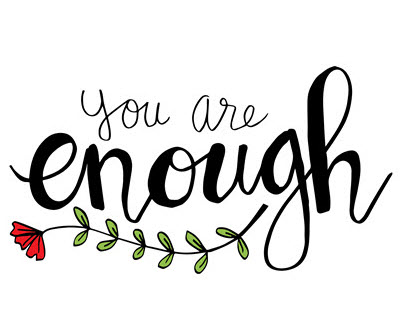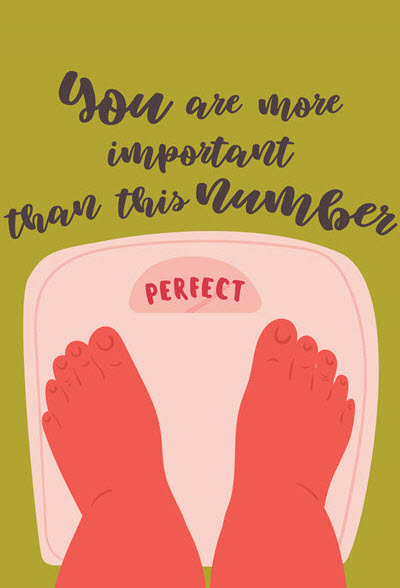 Destructive “Self-Projects”
Destructive “Self-Projects”
“Let’s see,” Dennetta* thought as she looked at her calendar, “I have 14 days until the party, so if I stop eating lunch, exercise at least 45 minutes every day, and stop eating anything after 8 pm, I should lose enough weight to feel good enough about how I look in my clothes to go. And, I may as well stop eating carbs, just protein and vegetables.”
This is not a one-time thought process for Dennetta when it comes to events in her life. She is always on “Project Dennetta,” looking for ways to control her eating in order to feel better about her body and ultimately about herself.
She doesn’t really “binge,” and she certainly doesn’t throw up her food, although she did try that on occasion when she felt particularly ‘gross’ about what she ate.
But there was a small voice in her head that was getting louder…
“I’m so tired of trying every diet available to lose weight and not being able to stick with it. I can’t seem to control my grazing of sweets at work, even though I want to be thinner.”
When the number on the scale doesn’t move, or God forbid goes up, she feels disgusted and ashamed, and her mood and day are ruined.
OR, if it drops several pounds, she feels relieved and quite good about herself. She has a sense of being “In control” and ready to tackle the problems of the day.
What is going on? Is this a full-blown eating disorder, or is it something else?
This type of disordered eating that is happening is certainly, by society’s standards, much more subtle of a problem and more difficult to pinpoint. And truthfully, it is encouraged and promoted by the billion-dollar diet industry as the normal way of dealing with food and our bodies. It’s validated by our culture as acceptable and “the norm.”
In our culture, there is an obsession with size, weight, diet, and exercise.
 The pervasiveness of disordered eating is astounding.
The pervasiveness of disordered eating is astounding.
Current research suggests that up to 50 percent of the population demonstrate problematic or disordered relationships with food, body, and exercise. (Note: rates of clinical eating disorders are much lower, estimated from 1 to 3 percent of the general population.)
However, just because someone falls short of meeting the criteria of a clinical eating disorder as spelled out in the Diagnostic and Statistical Manual of Mental Disorders V (DSM-V), this does not mean these people are maintaining a healthy relationship with food, body image, and weight.
These struggling people who demonstrate disordered eating may still be at risk both physically and emotionally.
Defining and recognizing disordered eating is a complicated issue. What are the signs and symptoms of disordered eating? How do you distinguish disordered eating from an actual eating disorder or even from more normative dieting behaviors? (Any form of dieting needs to be a red flag… a “Danger” sign of potential looming health concerns due to growing evidence of how dieting and severe restriction may lead to disordered eating and eating disorders.)
In a large study of 14- and 15-year-olds, dieting was the most important predictor of a developing eating disorder. Those who dieted moderately were 5x more likely to develop an eating disorder, and those who practiced extreme restriction were 18x more likely to develop an eating disorder than those who did not diet.
Golden, N. H., Schneider, M., & Wood, C. (2016). Preventing Obesity and Eating Disorders in Adolescents. Pediatrics, 138(3). doi:10.1542/peds.2016-1649
What does Disordered Eating look like?
The story told by Dennetta above is an example of just one scenario.
Symptoms of disordered eating may include behavior commonly associated with eating disorders, such as food restricting, binge eating, purging (via self-induced vomiting or excessive exercise, and use of diet pills and/ or laxatives).
However, disordered eating might also include:
- Your self-worth being based highly, or even exclusively, on your body shape and weight aligning with the world in which we live
- A problem in the way one experiences their body, i.e., a person with a healthy weight nonetheless feels they are overweight
- Excessive or rigid exercise routines (“I must ride my stationary bike 1 hour every night.”)
- Constant calorie counting. You know the amount of calories in almost all foods.
- Anxiety about certain foods or food groups (Keep the Oreos out of the house!)
- A rigid approach to eating, such as only eating certain foods, inflexible mealtimes, refusal to eat in restaurants or at a friend’s home or family gathering.
Ok, so this sounds bad. What makes this not a full-blown, clinically diagnosable eating disorder?
It boils down to severity and impact on your daily functioning. An individual with disordered eating is often engaged in some of the same behaviors as those with eating disorders but at a lesser frequency or lower level of severity.
Disordered eating is problematic and must be taken seriously.
And the truth is that individuals with disordered eating may be at risk for developing a full-blown eating disorder.
They’re also more likely to have a history of depression and/or anxiety, or be at risk for anxiety and depression at some point in the future.
So, what questions might you ask yourself about your own eating patterns? Here’s several to consider:
- Concentration and ability to focus: Do ongoing thoughts about food, body, and exercise prevent your best performance at work or school? Are your relationships suffering as a result of your perseverating on food, your bod, and exercise?
- Social life: Are you cancelling plans in order to keep your diet going, because you don’t yet trust yourself to eat your forbidden foods? Is your world shrinking in your efforts to control the way you eat and the way you look?
- Coping skills: Have you noticed your patterns of eating or not eating are being used as a way to manage life’s problems or cope with stressors?
- Discomfort and unease: Throughout the day, how uncomfortable are you when you think about the foods that are available and within your reach? Are these thoughts hard to shake and make you anxious?
 When you’ve had enough…
When you’ve had enough…
What does treatment look like if you determine you have had enough of crash dieting, fad diets, excessive exercising, body discomfort, and unhappiness?
Our sessions have a basic premise once you start…
STOP fad or crash diets. The more you restrict, the more likely your body will rebel and lead to binge eating. Dieting and bingeing are two sides of the same coin. We will work on making you a glorious and proud Diet Culture Drop Out.
Get curious about setting healthy limits on exercise and focus on physical activities that you really like! You know them… think about a time as a kid; what did you enjoy? What brings a smile to your face as you remember the activities you enjoyed? If there weren’t any, we are going to get curious today and find what DOES make you feel good. We will work to help you get in touch with the emotional enjoyment of moving your body for more than just calorie burning.
We will work on your inner critic and the negative self-talk you may not even be aware of yet. We will raise your intuitive voice and get in touch with the ‘part of you that knows’ that our diet culture is what is failing, not your efforts.
Throw away the scale. Scary? Yes, it is. But when you STOP placing your self-worth on a number, you will begin to feel the relief that comes from allowing yourself the healing that comes from nurturing all the parts of who you are: your mind, your emotions, your spirit, and of course your body. You will learn to see your body with more than your physical eyes currently anchored to the deceptions being force-fed you by a diet culture that is dysfunctional. You will see your whole being, and it will matter to you eventually.
Sound ridiculous? Sound impossible? It’s not!
But I get your skepticism.
The relationship we have with our bodies, as well as how we experience our size and shape in this thin idealized culture, is complex both emotionally and physically.
Call me. Let’s just talk about it: (713) 269-3972.
*Names changed to preserve client confidentiality.

